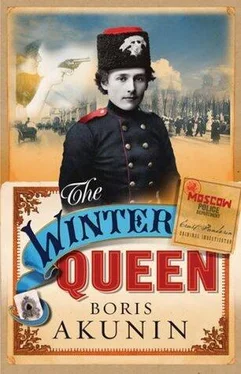From the list seized from Cunningham it had been possible to identify eighteen former wards of Astair Houses, but that was of little use, since it was impossible to determine which of them were members of the organization Azazel and which were not. Nonetheless, five of them (including the Portuguese government minister) had retired, two had committed suicide, and one (the Brazilian life guardsman) had even been executed. An extensive intergovernmental investigation had identified numerous notable and highly respected individuals who were former pupils of Astair Houses. Many of them made no effort to conceal the fact, actually priding themselves on the education they had received. Certainly, some of Lady Astair's children had preferred to go into hiding in order to avoid the troublesome attentions of the police and secret services, but the majority remained in their positions, since there was no crime of which they could be accused. Henceforth, however, the path to the highest level of state service was barred to them, and when appointments were made to high positions it became customary once again, as in feudal times, to pay particular attention to an individual's origins and pedigree. God forbid that some "foundling" (the style in which the competent circles referred to Lady Astair's wards) should ever worm his way to the top! The general public, however, was not even aware that any purge had taken place, since a series of carefully coordinated precautions and safeguards was implemented by the governments concerned. For some time rumors circulated of a global conspiracy of either Masons or Jews, or else of both of them together, and Mr. Disraeli's name was mentioned, but then it all seemed to die down, especially as the whole of Europe was agitated by the grave crisis that was brewing in the Balkans.
Fandorin had been obliged in the line of duty to participate in the investigation of the Azazel Affair, but had demonstrated so little diligence that General Mizinov thought it best to assign his capable young colleague to different work, to which Erast Fandorin applied himself with far greater energy. He felt that his conscience was not entirely clear in relation to the Azazel business and that he had played a somewhat ambiguous role. The oath sworn to the baroness (and broken against his own will) had substantially marred the happiness of the weeks preceding his wedding.
And now, on the very day of that wedding, what should happen but that Fandorin's gaze should fall upon the victims of his own "self-sacrifice, valor, and praiseworthy zeal" (as described in the imperial decree concerning his decoration).
Suddenly dejected, Fandorin hung his head morosely, and as soon as they arrived at her father's house on Malaya Nikitskaya Street, Lizanka acted decisively to take matters into her own hands. She withdrew with her gloomy husband into the cloakroom that was located beside the entrance hall and gave the strictest possible instructions that no one was to enter without permission. Fortunately the servants had enough to do in dealing with the guests arriving at the house, who had to be kept occupied until the banquet. Heavenly odors wafted through from the kitchen, where the chefs specially hired from the Slaviansky Bazaar had been laboring indefatigably since the crack of dawn. Behind the firmly closed doors of the ballroom the orchestra was running through its final rehearsal of the Viennese waltzes, and in general everything was proceeding according to plan. All that remained to be done was to restore the spirits of the demoralized groom.
Reassured on having ascertained that the cause of this sudden melancholia was not some inopportune reminiscence of an absent rival, the bride set confidently to work. Erast Fandorin's only response to direct questions was to mumble incoherently and attempt to turn away from her, and Lizanka was obliged to change tactics. She stroked her husband's cheek, kissed him first on the forehead, then on the lips, and then on the eyes. Gradually he relented, thawed, and became entirely manageable again. The newlyweds, however, were in no hurry to join their guests. The baron had already come into the hall several times and approached the closed door, even cleared his throat tactfully, but he had not dared to knock.
Eventually he was obliged to do so.
"Erast!" Alexander Apollodorovich called (as of today he had begun to address his son-in-law in familiar fashion). "Forgive me, my friend, but there is a special messenger here from St. Petersburg to see you. On some urgent matter!"
The baron glanced around at the dashing young officer in the plumed helmet who was posed in absolute immobility beside the entrance. Under his arm the special messenger was holding a square parcel wrapped in government standard-issue gray paper with sealing-wax eagles.
The bridegroom glanced out, red faced, from behind the door.
"You wish to see me, Lieutenant?"
"Mr. Fandorin? Erast Petrovich Fandorin?" the messenger inquired in a clear voice with a guards officer's lilt.
"Yes, I am he."
"An urgent secret package from the Third Section. Where should I put it?"
"Why, in here if you like," said Fandorin, making way for him. "Excuse me, Baron." (He was still unaccustomed to being on first-name terms with his father-in-law.)
"I understand. Business is business," said his father-in-law, bowing his head and closing the door after the messenger, while he himself remained outside to make quite sure that no one would intrude.
The lieutenant placed the package on a chair and extracted a sheet of paper from behind the lapel of his uniform jacket.
"Please be so kind as to sign for receipt."
"What is it?" Fandorin asked as he signed.
Lizanka stared curiously at the package, showing not the slightest inclination to leave her husband alone with the courier.
"I was not informed," the officer replied with a shrug. "It weighs about four pounds. I believe you are celebrating a happy event today? Could it perhaps be in that connection? In any case, please accept my personal congratulations. There is a letter here that will probably make everything clear."
He drew a small envelope without any address on it out of his cuff. "Permission to leave?"
Erast Fandorin examined the seal on the envelope, then nodded.
The special messenger saluted, turned smartly on his heels, and left the room.
The drawn shades made the room rather dark and Fandorin walked over to the window that looked directly out onto Malaya Nikitskaya Street, opening the envelope as he went.
Lizanka put her arms around her husband's shoulders and breathed in his ear. "Well, what is it? Congratulations?" she asked impatiently and then, catching sight of the glossy piece of card with two golden rings, she exclaimed, "Why, so it is! Oh, how lovely!"
That very second Fandorin's attention was caught by a rapid movement outside the window, and he glanced up to see the courier behaving in a rather strange fashion. He went racing down the steps, launched himself at a run into a waiting cab, and shouted to the coachman, "Go! Nine! Eight! Seven!"
As the coachman swung his whip he glanced around for an instant. Just an ordinary coachman: a hat with a tall crown, a graying beard, nothing unusual about him but the color of his eyes — extremely light, almost white.
"Stop!" Erast Fandorin shouted furiously, and without thinking what he was doing he leapt over the windowsill out into the street.
The coachman cracked his whip and his pair of blacks set off at a trot.
"Stop or I'll shoot!" Fandorin roared as he ran in pursuit, although he had nothing to shoot with — in honor of the wedding his trusty Herstal had been left at the hotel.
"Erast! Where are you going?"
Fandorin glanced back as he raced along. Lizanka was leaning out of the window with an expression of total bewilderment on her face. The next moment flames and smoke came bursting out of the window and Fandorin was hurled roughly to the ground.
Читать дальше









